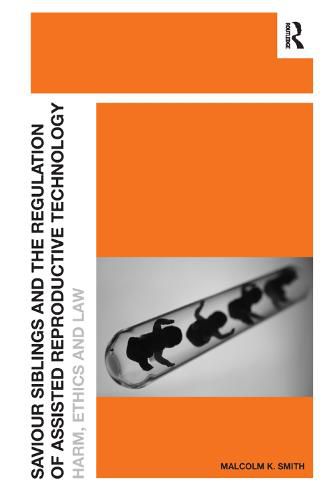Readings Newsletter
Become a Readings Member to make your shopping experience even easier.
Sign in or sign up for free!
You’re not far away from qualifying for FREE standard shipping within Australia
You’ve qualified for FREE standard shipping within Australia
The cart is loading…






Advances in the field of Assisted Reproductive Technology (ART) have been revolutionary. This book focuses on the use of ARTs in the context of families who seek to conceive a matching sibling donor as a source of tissue to treat an existing sick child. Such children have been referred to as ‘saviour siblings’. Considering the legal and regulatory frameworks that impact on the accessibility of this technology in Australia and the UK, the work analyses the ethical and moral issues that arise from the use of the technology for this specific purpose. The author claims the only justification for limiting a family’s reproductive liberty in this context is where the exercise of reproductive decision-making results in harm to others. It is argued that the harm principle is the underlying feature of legislative action in Western democratic society, and as such, this principle provides the grounds upon which a strong and persuasive argument is made for a less-restrictive regulatory approach in the context of ‘saviour siblings’. The book will be of great relevance and interest to academics, researchers, practitioners and policy makers in the fields of law, ethics, philosophy, science and medicine.
$9.00 standard shipping within Australia
FREE standard shipping within Australia for orders over $100.00
Express & International shipping calculated at checkout
Advances in the field of Assisted Reproductive Technology (ART) have been revolutionary. This book focuses on the use of ARTs in the context of families who seek to conceive a matching sibling donor as a source of tissue to treat an existing sick child. Such children have been referred to as ‘saviour siblings’. Considering the legal and regulatory frameworks that impact on the accessibility of this technology in Australia and the UK, the work analyses the ethical and moral issues that arise from the use of the technology for this specific purpose. The author claims the only justification for limiting a family’s reproductive liberty in this context is where the exercise of reproductive decision-making results in harm to others. It is argued that the harm principle is the underlying feature of legislative action in Western democratic society, and as such, this principle provides the grounds upon which a strong and persuasive argument is made for a less-restrictive regulatory approach in the context of ‘saviour siblings’. The book will be of great relevance and interest to academics, researchers, practitioners and policy makers in the fields of law, ethics, philosophy, science and medicine.